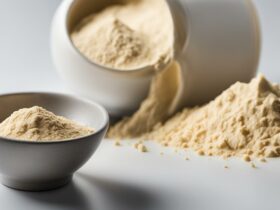Contents
Boosts Energy and Alertness
Caffeine acts as a stimulant by blocking adenosine receptors in the brain, which prevents drowsiness and promotes wakefulness. When consumed, caffeine quickly gets absorbed into the bloodstream, making its way to the brain, where it binds to adenosine receptors, effectively blocking adenosine’s sedative effects. As a result, caffeine boosts energy levels and promotes alertness, helping you feel more awake and focused throughout the day.Enhances Physical Performance
If you’re an athlete or enjoy engaging in physical activities, caffeine can provide a significant performance boost. Research has shown that caffeine ingestion before exercise can improve endurance, reduce fatigue, and enhance overall athletic performance. It works by increasing the release of adrenaline and stimulating the production of endorphins, helping you push through intense workouts and achieve better results.Weight Management Aid
For those looking to shed a few pounds, caffeine can be a valuable ally in your weight loss journey. One of the notable benefits of caffeine is its ability to boost metabolism. By increasing metabolic rate, caffeine helps your body burn calories more efficiently, contributing to weight loss. Additionally, caffeine acts as an appetite suppressant, curbing cravings and reducing the desire to snack between meals.Improves Cognitive Function
Coffee is often associated with increased productivity and improved cognitive performance, and caffeine is the primary reason behind it. Caffeine stimulates the release of neurotransmitters like dopamine, norepinephrine, and serotonin, which play crucial roles in brain function. As a result, consuming caffeine can enhance memory, concentration, and overall cognitive function, making it an ideal companion for studying or mentally demanding tasks.Mood Enhancement
Feeling down or in need of a mood boost? Caffeine might be just what you need. It has been found to have positive effects on mood and emotional well-being. By blocking adenosine receptors and increasing dopamine production, caffeine can enhance mood, promote feelings of happiness, and even reduce the risk of depression. However, it’s important to note that excessive caffeine consumption may have the opposite effect, leading to restlessness or anxiety, so moderation is key.Provides Antioxidants
Antioxidants are substances that help protect our cells from damage caused by harmful molecules called free radicals. Surprisingly, caffeine is a significant source of antioxidants in the average Western diet. Regular consumption of caffeine-rich beverages, such as coffee and tea, can contribute to your daily antioxidant intake. Antioxidants play a crucial role in reducing the risk of chronic diseases, including heart disease, cancer, and neurodegenerative disorders.Supports Digestive Health
Caffeine can have a positive impact on your digestive system as well. It stimulates the muscles in your gastrointestinal tract, promoting gut motility and helping food move more smoothly through your digestive system. This can aid in relieving constipation and promoting regular bowel movements. However, it’s worth noting that excessive caffeine intake can have the opposite effect and lead to loose stools or even diarrhea, so moderation is key.Reduces the Risk of Certain Diseases
Research suggests that regular caffeine consumption may help protect against certain diseases. Studies have shown that caffeine intake is associated with a lower risk of Parkinson’s disease, Alzheimer’s disease, and liver disease. While more research is needed to understand the exact mechanisms behind these associations, these findings provide additional reasons to enjoy your daily cup of coffee or tea.May Extend Lifespan
Believe it or not, caffeine consumption has also been linked to increased longevity. Several studies have found that moderate caffeine intake is associated with a reduced risk of premature death. While the exact reasons for this correlation are still being explored, it’s worth noting that this benefit seems to be most prominent when caffeine is consumed in moderate amounts, rather than excessively.Safety and Moderation
While caffeine offers numerous benefits, it’s important to consume it in moderation and be aware of your body’s tolerance levels. The recommended daily caffeine intake for adults is generally considered to be around 400 milligrams, which is roughly equivalent to four cups of coffee. However, individual sensitivities may vary, and some people may experience adverse effects with lower amounts. It’s essential to listen to your body and adjust your caffeine intake accordingly.Conclusion
In conclusion, caffeine offers a range of surprising benefits beyond its ability to keep you awake and alert. From boosting energy levels and enhancing physical performance to improving cognitive function and mood, caffeine has become a valuable companion for many individuals. Additionally, its potential role in disease prevention and extended lifespan adds further reasons to enjoy your daily dose of caffeine. Just remember to consume it in moderation and be mindful of potential side effects.กาเฟอีน กินมากเกินไปจะเป็นอย่างไร
Can Caffeine be used as an ingredient in Cake Recipes?
Caffeine can indeed be used as an ingredient in delicious cake recipes. Adding a small amount of coffee or espresso powder to the cake batter can enhance its flavor, making it richer and more complex. However, it’s essential to use it in moderation as caffeine can have a potent effect.
FAQs
- Is caffeine addictive?
- While caffeine can lead to dependence and withdrawal symptoms, it is not considered as addictive as substances like drugs or alcohol. Moderate caffeine consumption is generally safe for most people.
- How much caffeine is too much?
- Excessive caffeine consumption, typically exceeding 500-600 milligrams per day, can lead to side effects such as restlessness, anxiety, and sleep disturbances. It’s important to stay within recommended daily limits.
- Can caffeine improve athletic performance?
- Yes, caffeine has been shown to enhance athletic performance by increasing endurance, reducing fatigue, and improving focus and concentration. It is a popular supplement among athletes.
- Does decaffeinated coffee provide the same benefits?
- Decaffeinated coffee contains significantly less caffeine, so its effects on energy, alertness, and physical performance are not as pronounced. However, decaf coffee still retains some of the other beneficial compounds found in regular coffee.
- Are there any health risks associated with caffeine consumption?
- While moderate caffeine consumption is generally safe for most individuals, excessive intake can lead to side effects such as rapid heartbeat, high blood pressure, and digestive issues. It’s important to be mindful of your caffeine intake and listen to your body’s response.










